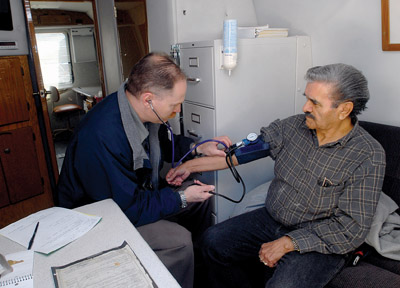
Mobile vets units in Hollister for the first time
Whether someone is a veteran of World War II or Iraq, despite a
generational gap spanning six decades, he or she routinely shares
the same signs of combat trauma. The way U.S. Department of
Veterans Affairs counselor Brock McNabb explained it: If he tape
recorded someone with the disorder from each of the wars,
”
They would sound exactly the same.
”
Sometimes, though, what those veterans want most is for someone
to understand, to listen.
Mobile vets units in Hollister for the first time
Whether someone is a veteran of World War II or Iraq, despite a generational gap spanning six decades, he or she routinely shares the same signs of combat trauma. The way U.S. Department of Veterans Affairs counselor Brock McNabb explained it: If he tape recorded someone with the disorder from each of the wars, “They would sound exactly the same.”
Sometimes, though, what those veterans want most is for someone to understand, to listen.
“They want to know, why? Why am I like this? What can I do?”
“Then,” said the Iraq War veteran, “you let them cry. They realize it’s OK.”
McNabb and others with the V.A.’s Mobile Vets Center – based in Santa Cruz –and a separate Mobile Medical Team from the federal agency came to Hollister on Wednesday from 9 a.m. to 3 p.m. to offer such counseling, medical and other services to local veterans.
It’s believed to be the first time the mobile units came here, and organizers such as Gulf War veteran and local resident Richard Herrera expect it won’t be the last, especially with a greater emphasis in the V.A. for outreach to rural communities such as San Benito County.
The VA’s presence here is part of an effort to make the often complicated range of services offered by the agency more accessible to the public, particularly areas like ours where the closest facilities are in Santa Cruz, San Jose and Monterey.
Aside from the two, large mobile units parked outside the Veterans Memorial Building, other services were offered inside such as an area set up specifically for homeless veterans, and another for younger generations from the two Iraq and Afghanistan wars. Alfonso Molina, a veteran of both of those wars himself, was overseeing that station Wednesday. His job is to “transition the severely injured” veterans from Iraq or Afghanistan into the health care system.
With one of veterans organizations’ bigger challenges being the interest level of younger veterans, with many of the World War II, Korean War and Vietnam soldiers aging, Molina said the agency tries to encourage their involvement by going to events like the one in Hollister this week, along with larger civic gatherings.
There is a big movement, however, toward using the Web, he said.
“A lot of it now is on the Internet, using Twitter and Facebook,” he said. “It’s really small (the number of younger veterans involved), but they’re trying to build it up.”
From the station where Molina stood at the building’s entrance, veterans had many options, including an area upstairs where nurse practitioners and doctors from the medical team were available.
Outside the building, inside the Mobile Veterans Center, McNabb noted how the vehicle is one of only 50 in the entire United States and one of four in California. The counselors face a range of issues from veterans, none more common than post-traumatic stress disorder and sexual trauma, noted Danny Molina, another counselor who works with McNabb.
They actually got called to Fort Hood, Texas, last fall after the shootings there and they spent 10 days doing outreach.
What it often takes in helping veterans curtail their troubles is letting them understand they’re not alone, McNabb said.
“All of the sudden, these guys are letting it go,” he said.








